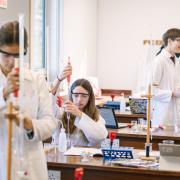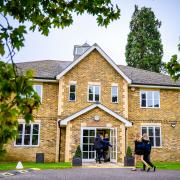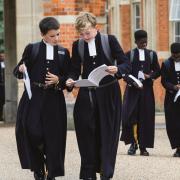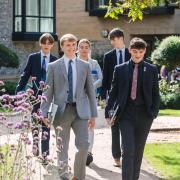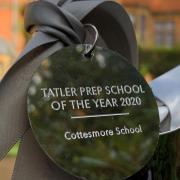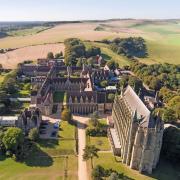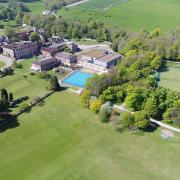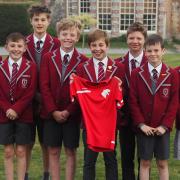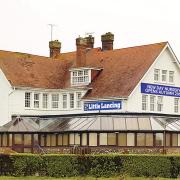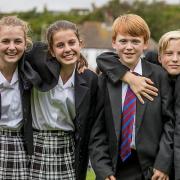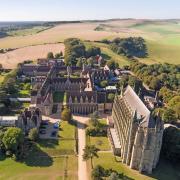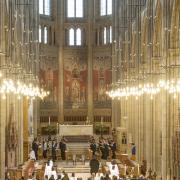Johnny Ball’s shows inspired a generation to enjoy learning maths. He may be the face of Think of a Number, Think Backwards and Johnny Ball Reveals All, yet Ball himself left school with just two O-levels. The 76-year-old tells how the right teacher makes all the difference.

I was born in 1938, so I was seven years old in 1945, just at the end of the war. I went to Kingswood Primary School in Bristol and in those days schools were much more rigid.
My teacher was Mr Benson and the pupils would bang on the desks, saying: “We want homework. We want homework.” Mr Benson said, “you don’t get homework until you’re nine.” “But we want homework” everyone would shout, so he gave us maths homework when we were seven. He must have been doing something absolutely right. Mr Benson would say “here’s 100 sums, do just 10 and I’ll be very happy,” but it was never compulsory.
In those days, the whole family sat around listening to the radio. My dad would do one thing, my mum another, and I would work at my maths with the radio playing. A handful of us wouldn’t just do the 10 sums, we would do the 100. Why? Because they were there, because it was easy and because we loved it. That’s what it was all about.
After I took my 11+ my parents moved to Bolton in Lancashire and I went to Bolton County Grammar School. At that time, because there was no television, so a West Country accent was almost a foreign accent in Lancashire. That could be why I started in form 2B (b-stream), but went from there on to form 3C, 4D, lower 5D…
I didn’t take notes in maths but I got 100 per cent in the CSE because I just loved the subject. I didn’t need to be taught it, I just absorbed it.
But as for everything else . . . I got just two O-levels after such a promising primary education. But that was the spur for me to realise that I had to get an education. So I went into the Armed Forces and signed up for three years; that was my university. That was my three years of drinking with the lads, having a great time and also working and earning. I loved the Forces. I rubbed shoulders with the boffins in Radar, I lapped it all up and suddenly realised I had a great scientific and mathematical mind.
I started reading maths books when I was 21 years old. At about 39, someone said: “If you had your own series on television what would you do?” and I said “I’d do a programme on maths”, because it was my hobby. So I did Think of a Number, and my whole career changed again.
Twenty years ago I did a video in Lancashire and we filmed a classroom of kids. When we finished I said ‘they were great!’ and the teachers said, ‘of course they were; they were the elite children’. I said ‘I’m sorry?’ It turned out they were the top half a dozen in each form. I said ‘why have you done that?’ And they said, ‘oh, the rest are a rabble!’ Then the teacher told me that within six weeks of coming to this school they divide them roughly 35/65, and teach 35 per cent, and the rest paddle along. That shocked me and made me look a lot deeper into the National Curriculum and the way we teach.
If teachers are only trained to teach the curriculum then you can’t really consider them to be real teachers. You’ve got to teach beyond that; you’ve got to be the person to whom a child can say, ‘why has that happened, what’s happening there, how come this is happening?’ Now you can Google absolutely anything and get a pretty good rundown of any topic in a couple of minutes.
You need at least one teacher in every school – one for maths, one for science, one for languages and so on – you need people who will go the extra mile and who will never say ‘I’m afraid I don’t know that. Besides which, it’s not something you learn on the curriculum this year’. That should never be an answer if a child wants to know something. The more a child wants to learn, the teacher must be there, irrespective of curriculum. They must be there to teach them what they want to learn at that very moment.
The curriculum is really only there to test teachers and their ability to get across a certain amount of material. But that’s not education – education is far beyond that.
I’m not knocking the curriculum, but I’m pointing out that it is limited by the very fact that you teach ‘x’ on the second Thursday on September, in this textbook. It’s all right if you want a yardstick to measure against, but teachers have got to give much more to kids.
The reason I plug the way kids should be taught today is because I had to absorb what was around me. Apart from secondary school I had no negativity in my life, everybody said ‘my God, you can do this’ and I knew I could; from being a stand-up comedian through to being a drummer, through being all kinds of things, I’ve been successful - but I was abysmal at my secondary grammar school.
Perhaps if Mr Benson had moved with us to Lancashire things would have worked out very differently. He was a teacher I admired because he approached everything with flexibility and freedom. True, he didn’t have the constraints of the National Curriculum, but I get the feeling that even if he did have those ties, he’d have done his own thing anyway.
***
Factfile...
Name: Johnny Ball, born Graham Ball
Job today: Presenter, President of the Slough, Windsor and Maidenhead Theatrical Society, and President of the Farnham Common Community Library.
Born in: Bristol
Lives in: Farnham Common, Buckinghamshire
Best subject: Maths
Finest moment in school: 100% maths CSE
Most important thing learned: The only reason kids go to school is to learn how to learn.
***
Think of a Number by Johnny Ball, published by Dorling Kindersley, is available now
--------------------------------------------------
Read the latest edition of A+ Education - Sussex, Surrey and Kent here




